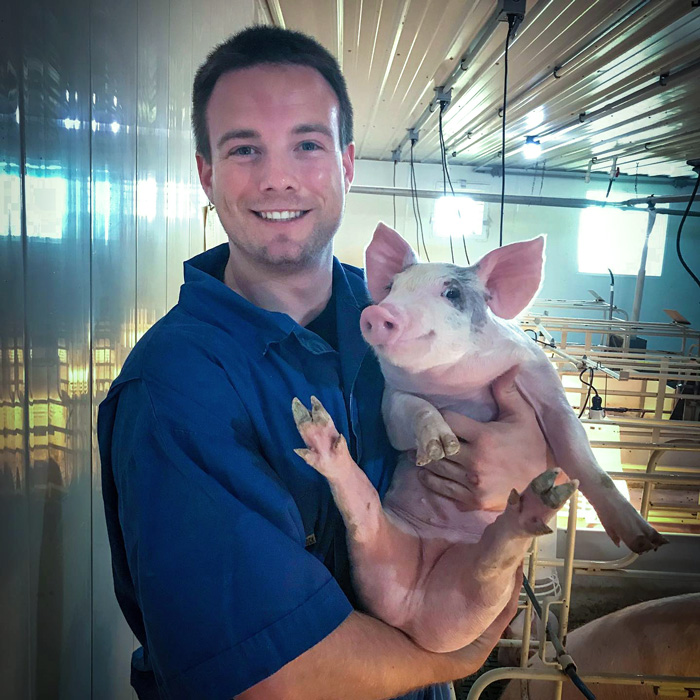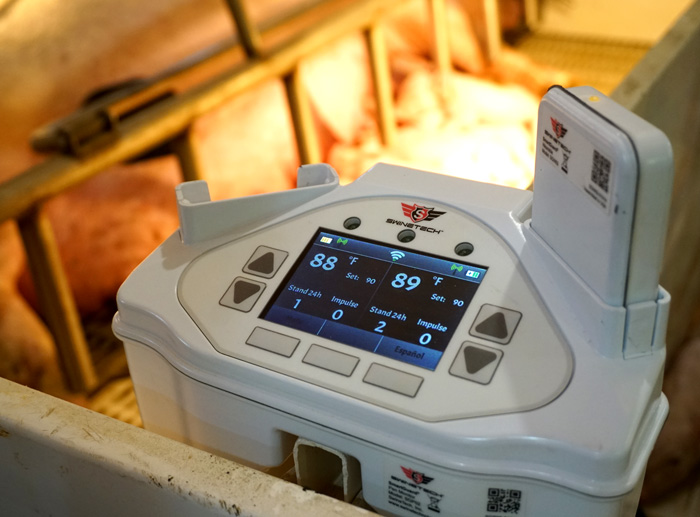
Small Companies Think Big
Mini profiles of successful CPG and ag tech entrepreneurs.
Article Content
Want a dose of innovation inspiration? Check out these food, beverage, and ag-tech founder stories.
The products that the startups are bringing to market are dissimilar—a tool to reduce mortality in swine production, a specialty spirit, flavored water, and superpremium ice cream—but the founders share common traits: passion, persistence, and a facility for problem solving. And then there’s the must-have business survival skill of 2020—the ability to pivot.
Here’s how Matthew Rooda, Emily Darchuk, Yanni Hufnagel, Darryl Stewart, and Joseph and Zainab Chaeban are navigating the sometimes-perilous path to startup success.
Birthing New Pig Farrowing Technologies
A few months into the COVID-19 pandemic, Matthew Rooda’s SwineTech startup, marketer of an innovative technology to reduce piglet mortality, faced a daunting situation.
“The supply chain broke,” says Rooda. “Nobody needed more pigs. In fact, a lot of people needed less pigs.”
And that translated to less demand for the company’s innovative SmartGuard technology that Rooda and his co-founders had developed a few years before to prevent the problem of piglets being crushed to death by their mothers shortly after birth.
Tapping into a reserve of resourcefulness that Rooda attributes to growing up in a farm family where his father and grandfather frequently had to rely on their own ingenuity to invent solutions to operational challenges, he switched gears and started calling SwineTech’s customers to chat about pig production challenges.
“We were able to have more access to our customers than ever before because everybody had a little bit more time,” says Rooda. “I think COVID actually helped us develop an opportunity that we never would have identified if it had never taken place.
“I think I met with 30 or 40 companies—over 60% of the industry—in a month’s time,” Rooda continues. “I got a ton of feedback.”
That feedback led the SwineTech team to develop a tool they named PigFlow that digitizes and streamlines the farrowing management process and helps address one of the scourges of pig production—the fact that 210 million piglets die annually during the birth process.
Farrowing management can be complicated, something Rooda knows from growing up on a pig farm and his own experience working a summer job as a farrowing manger. At any one time in an operation, 40 sows may be giving birth, and with limited resources, it’s tough to keep tabs on which ones may need some assistance, Rooda explains.
Using PigFlow allows farm employees “to leverage the data that they were already collecting to bring organization and teamwork straight to their phones,” says Rooda. “What this does is it tells them who’s giving birth, what’s the status of the birthing processing, and [in] how many minutes do I need to go check again.”
PigFlow already is in use on farms in Iowa, Ohio, and Minnesota, Rooda says, and feedback has been positive. It’s going so well, in fact, that Rooda expects SwineTech’s 2021 revenue to be four times what it was in 2020.
The new pig technology platform wasn’t the only SwineTech product born of the pandemic. The company also debuted a podcast called Popular Pig, and Rooda says it’s been a good way to stay connected with customers.
Life as a purveyor of sophisticated pig production technologies isn’t necessarily what Rooda envisioned for himself. He’d originally aspired to a career as a medical doctor and in addition to his work as a farrowing manager also spent time working in a nursing home during his college years. In the latter setting, “I was able to see where technology had taken health care,” he says. And that got him thinking about opportunities to apply it on the farm.
Although Rooda didn’t get his MD, he graduated from the University of Iowa with a degree in enterprise leadership and is currently working on an MBA and applying that learning leading his SwineTech team of 12.
Now 27, Rooda founded SwineTech at the age of 21 while he was in college, along with his friend and fellow student Abraham Espinoza and engineer John Rourke, who created the company’s prototype products. Grants and prize money from pitch events and other competitions netted SwineTech about $300,000 early on, enough to fund its first two years of operation.
Now Rooda’s eager to expand SwineTech globally and anticipates that eventually the company will be acquired. “We want to transform the swine industry,” says Rooda. “We want to change the way we look at work and quality of care for pigs.”
Crafting a Standout Spirit With a Sustainability Story
With a couple of master’s degrees on her resume (an MBA and an MS in food science) and nearly a decade of food industry experience, Emily Darchuk has a practical perspective on product development. She knows the ins and outs of creating a flavor profile, scaling up for a launch, and managing co-packer relationships.
She’s also mission-driven and imaginative—maybe even a bit of a dreamer. Which may be why she named her company Wheyward Spirit. Well, that and the fact that the unique specialty spirits her company produces use some of the billions of pounds of whey left over from cheesemaking as a starting point.
As a food scientist, Darchuk knew it was possible to convert whey into alcohol, as some other companies have done, but she wanted to create something different—something that retained the flavor of the origin ingredient.
“Why would I want to strip all of that out?” she asks. “We do things differently for the right reasons,” she adds, explaining that the clear, single batch spirit targets consumers who want a distinctive product with a sustainability story behind it.
Darchuk spent hundreds of hours running fermentation trials on her own to develop a flavor profile and then partnered with a craft distiller to commercialize Wheyward Spirit, which boasts hints of vanilla cream, warm oak, and spice notes.
Her fledgling venture got a boost when she met Stonyfield Yogurt co-founder Gary Hirshberg and he began serving as a mentor. The startup also benefited from a grant Darchuk secured as an accelerator participant, which allowed her to conduct extensive consumer testing to validate the spirit’s flavor profile.
Wheyward Spirit made its debut this past fall via e-commerce and ships to 30 states. It’s also available at some California retailers. Darchuk plans to continue the move into retail distribution this year.
Expect more Wheyward Spirit offerings in the future. “We definitely have additional R&D ready to go,” she says. But don’t expect the company to stray too far from its mission of crafting authentic, sustainable products of “substance and soul.” That’s because “we like staying true to our roots,” says Darchuk.
Quenching a Thirst for Healthy Hydration
When Yanni Hufnagel pitches his Lemon Perfect startup to investors, he’s likely to mention his “unrelenting will to win,” sounding very much like the college basketball coach he was for a decade prior to founding the company.
The former coach’s fervor coupled with his healthful product proposition—a lightly flavored, no sugar, cold-pressed lemon water—has proven compelling to investors, including a number of National Basketball Association players. Hufnagel has raised $11.6 million in three rounds of financing since founding the company in 2017.
With 5 calories per 12-ounce bottle, Lemon Perfect is sweetened with organic erythritol and stevia and available in six varieties.
“It’s the intersection of great taste that’s also good for you,” says Hufnagel, who came up with the idea for the product after realizing that he found the taste of plain lemon water recommended in a keto diet book unpalatable. “Fast forward a couple of weeks, and our players are in the locker room drinking Vitamin Water and Bai, and the lightbulb went off,” he relates. “I just said, ‘hold on: can we give lemon water the flavor of Main Street America?’”
Hufnagel got to work, and Lemon Perfect now is available on Amazon and in Target stores around the country. The entrepreneur is most excited about its presence in Publix supermarkets in the Southeast, where it is establishing a beachhead in the beverage category, Hufnagel says, thanks to a focused merchandising strategy driven by strong field support.
“We’re going to build Lemon Perfect in the same way that the great beverage brands before us have, with a strong field team that’s in the trenches every day driving the brand and building awareness,” he says.
Hufnagel contends the flavored water category has seen little innovation since the Bai brand arrived on the scene more than a decade ago. “It’s a sleepy category with big opportunity, and we believe that we can disrupt it in a very meaningful way,” he says.
Selling Ice Cream by Subscription
Ice cream lovers in the Canadian city of Winnipeg got a new option for helping beat the pandemic blues this winter—direct-to-the-door monthly delivery of two pints of superpremium ice cream. The ice cream subscription service, which debuted in November 2020, also saved the day for the entrepreneurial operators of the Chaeban Ice Cream Shop, which had been forced to close that spring as a result of the pandemic, just as its busiest sales season began.
“We knew we either had to pivot the business or we wouldn’t make it through the summer,” says Darryl Stewart, who partnered with Joseph Chaeban, a dairy scientist, and his wife, Zainab, on the ice cream shop. The business opened its doors in 2017 with a goal of providing employment for some of Zainab’s family, Syrian refugees who had relocated to Winnipeg. With exotic flavors of ice cream like Salty Carl and Anna Bananutella made using local ingredients, the ice cream shop quickly became a hit with Winnipeg residents.
After arriving at the idea of a subscription service and identifying an e-commerce partner, Stewart and the Chaebans decided to put the government COVID relief funding they received to use purchasing software and management systems and hiring drivers.
Subscription sales exceeded expectations. In just two weeks, the company attracted more than 1,000 subscribers, and the owners were able to rehire some of the employees who had been laid off. Subscriptions now account for more than half of Chaeban’s revenues, with wholesale sales to grocery retailers in the province of Manitoba supplying the rest. Chaeban Ice Cream Club customers have the option of signing up for ice cream delivery for three, four, six, or 12 months, and Chaeban promotes gift subscriptions for special occasions.
The partners are looking forward to reopening the store when it is safe to do so, but subscriptions will be part of the business model going forward, with plans in the works to add delivery of a recently launched artisanal cheese and to expand the subscription ordering options.
Get more insights into the challenges of entrepreneurship in a related article, “Startup Lessons Learned.”
















